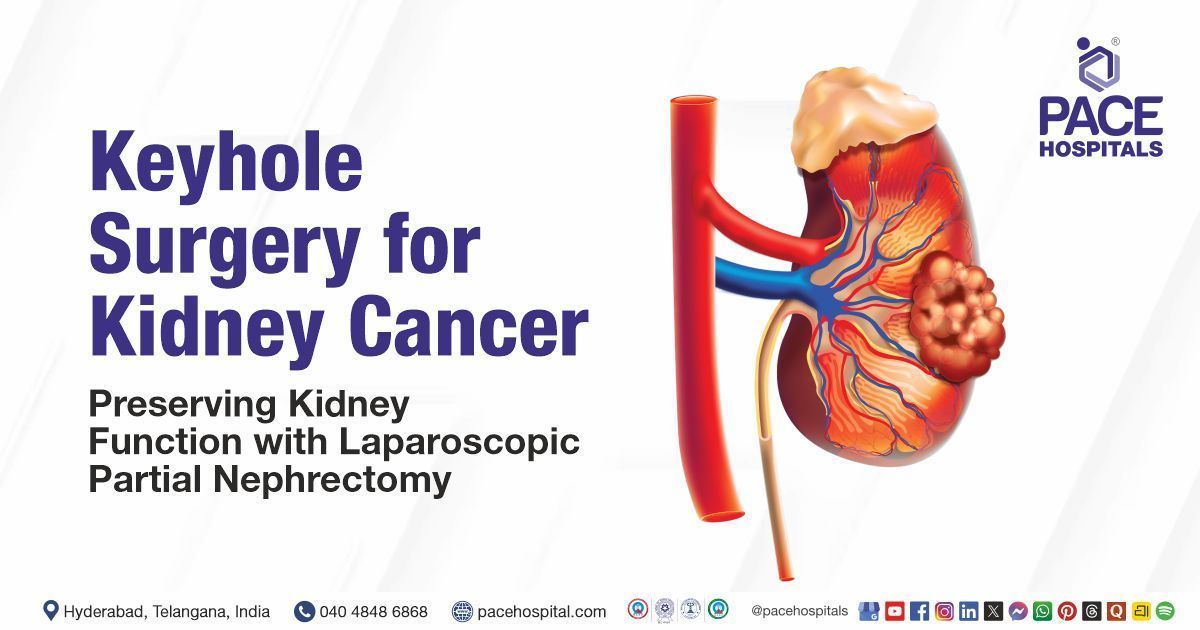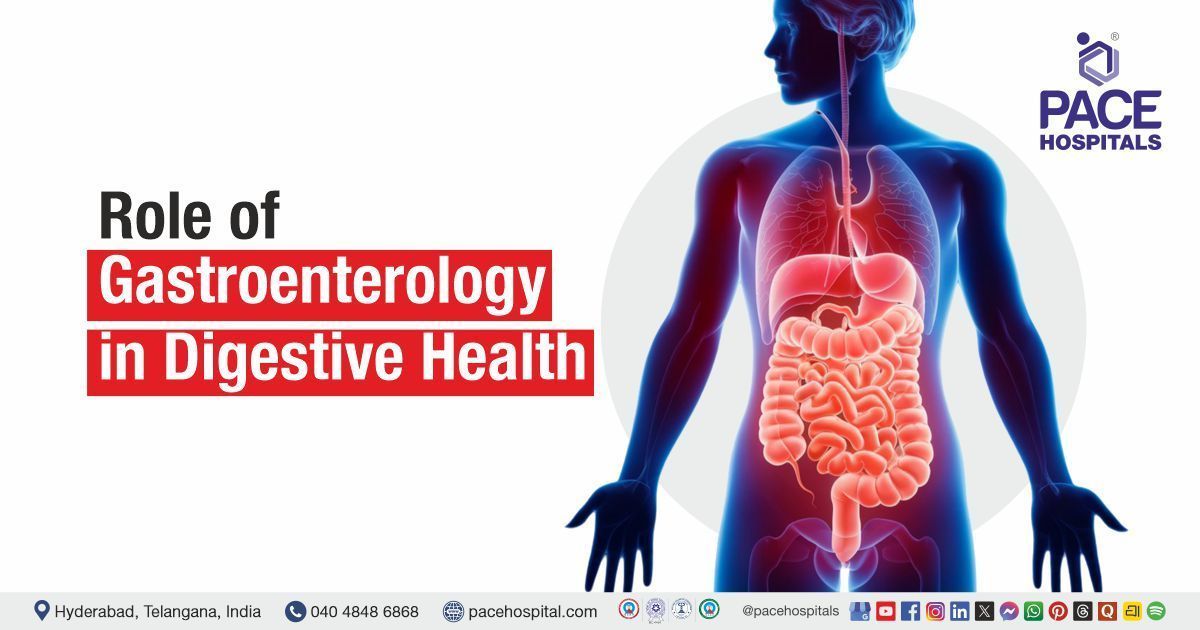Keyhole Surgery for Kidney Cancer: Partial Laparoscopic Nephrectomy
PACE Hospitals
Written by: Editorial Team
Medically reviewed by: Dr. Vishwambhar Nath - Senior Consultant Urologist & Renal Transplant Surgeon
Kidney cancer is increasingly detected at an early stage due to the widespread use of ultrasound, CT scans, and MRI performed for unrelated health concerns. Early detection has significantly changed how kidney tumors are treated. Instead of removing the entire kidney, modern surgical practice now prioritises removing only the tumour while preserving as much healthy kidney tissue as possible. This approach not only treats cancer effectively but also protects long-term kidney function.
Laparoscopic partial nephrectomy commonly known as keyhole surgery for kidney cancer, is a minimally invasive surgical technique designed to remove kidney tumors with precision while minimising trauma to the body. It combines oncological safety with faster recovery and better preservation of renal function, making it a preferred option for selected patients with localised kidney cancer.
Understanding Kidney Cancer
Most kidney cancers arise from the renal cells (also known as kidney cells), and are collectively referred to as renal cell carcinoma (RCC). These tumors often grow silently, without causing pain or visible symptoms in the early stages. Many patients are diagnosed incidentally during imaging for abdominal pain, back pain, or routine health evaluations.
When kidney cancer is confined to the kidney and has not spread to surrounding tissues or distant organs, surgical removal remains the most effective form of treatment. The choice between removing the entire kidney and preserving part of it depends on tumour characteristics, kidney function, and patient-specific factors.
Why Kidney Preservation Is Important?
The kidneys play a vital role in filtering waste products of body, regulating blood pressure, maintaining electrolyte balance, and supporting overall metabolic health. Removing an entire kidney can increase the risk of chronic kidney disease (CKD), cardiovascular problems, and long-term dialysis dependency, particularly in people who have prexisting diseases like diabetes, hypertension, or pre-existing kidney impairment.
Partial nephrectomy tries to strike a balance between cancer control and organ preservation. This treatment helps to maintain renal reserve and decreases long-term health concerns while not compromising cancer results in early-stage disease.
What Is Laparoscopic Partial Nephrectomy?
Laparoscopic partial nephrectomy is a minimally invasive surgical procedure in which only the tumour and a small margin of surrounding tissue are removed, leaving the rest of the kidney intact. The surgery is performed through small incisions using specialised instruments and a high-definition camera that provides magnified visualisation of internal structures.
Compared to traditional open surgery, the laparoscopic approach causes less tissue disruption, reduces post-operative pain, and allows for faster recovery. In some cases, robotic assistance may be used to enhance precision, particularly for complex tumors.
Who Is Suitable for Keyhole Kidney Cancer Surgery?
Not every kidney tumour requires removal of the entire kidney. Laparoscopic partial nephrectomy is commonly considered for:
- Tumors smaller than 4 cm in diameter
- Select tumors between 4 and 7 cm, depending on location and complexity
- Tumors located away from major blood vessels or the collecting system
- Patients with a single functioning kidney
- Individuals with bilateral kidney tumors
- Patients with reduced baseline kidney function
- Younger individuals where long-term kidney preservation is important
Final suitability is determined after detailed imaging and overall medical evaluation.
Preoperative Assessment and Planning for Partial Nephrectomy
Accurate planning is an integral part for safe and effective partial nephrectomy. Preoperative evaluation and assesment typically includes contrast-enhanced CT scans or MRI to assess tumour size, depth, blood supply, and relationship to nearby surrounding structures. These scans help surgeons to take decision for the best surgical approach and anticipate potential challenges.
Blood tests are performed to assess kidney function, haemoglobin levels, and general fitness for surgery. Preoperative counselling focuses on explaining the procedure, expected recovery, and potential risks.
How Laparoscopic Partial Nephrectomy Is Performed?
The procedure is carried out under general anaesthesia. Small incisions are made in the abdomen to insert a laparoscope (camera) and surgical instruments. The kidney is carefully exposed, and the tumour is identified.
To allow precise tumour removal and minimise bleeding, blood flow to the kidney may be temporarily controlled. The tumour is excised along with a thin margin of healthy tissue to ensure complete removal. The kidney is then reconstructed to restore normal anatomy and control bleeding.
The removed tissue is placed in a protective bag and extracted through one of the small incisions for histopathological examination.
Advantages of the Laparoscopic Approach
Keyhole surgery for kidney cancer offers several advantages over open surgery:
- Preservation of healthy kidney tissue
- Smaller incisions with minimal scarring
- Reduced blood loss
- Lower post-operative pain
- Shorter hospital stay
- Faster return to daily activities
- Comparable cancer control for early-stage tumors
These benefits make laparoscopic partial nephrectomy an attractive option for eligible patients.
Recovery After Keyhole Kidney Cancer Surgery
Most patients begin walking within a day after surgery and gradually resume oral intake. Pain is generally mild to moderate and managed with medications. Hospital stay is usually shorter compared to open surgical procedures.
Normal activities can often be resumed within two to four weeks, although heavy lifting and rigorous exercises affecting body should be avoided until advised. Follow-up appointments and regular check-ups are scheduled to focus on wound healing, kidney function assessment, and pathology review to have better outcomes.
Kidney Cancer Control and Long-Term Outcomes
For early-stage kidney cancer, partial nephrectomy provides excellent cancer control rates comparable to radical nephrectomy. Numerous research based studies have shown that removing only the tumour does not compromise survival outcomes when appropriately selected.
Importantly, preserving kidney tissue lessen the long-term risk of chronic kidney disease, which is closely linked to cardiovascular morbidity and reduced life expectancy. Long-term follow-up includes periodic imaging and kidney function monitoring to detect recurrence early.
Possible Risks and Complications
Although laparoscopic partial nephrectomy is considered safe and not problematic but potential risks may include bleeding, urine leakage, infection, injury to surrounding organs, or temporary reduction in kidney function. In rare cases, conversion to open surgery may be required for needed safety management.
Careful surgical planning, advanced imaging tests, and postoperative monitoring significantly reduce these risks avoiding open surgery.
Life After Partial Nephrectomy
Most people live a normal life after surgery, with their kidney function intact. Maintaining a healthy lifestyle, maintaining blood pressure, managing blood sugar levels, and avoiding nephrotoxic drugs all contribute to long-term kidney health. Regular follow-up is critical for detecting recurrences or problems early on and safeguarding general health.
FAQs on Kidney Cancer and Laparoscopic Partial Nephrectomy
What is keyhole surgery for kidney cancer?
Keyhole surgery describes a minimally invasive approach in which kidney tumors are treated using laparoscopic techniques. Through small incisions, surgeons use specialised instruments and a high-resolution camera to accurately remove the tumour. Compared to traditional open surgery, this approach allows for more precise excision of cancerous cells while preserving healthy kidney tissue and reducing blood loss.
Is keyhole kidney cancer surgery as effective as open surgery?
For appropriately selected early-stage tumors, laparoscopic partial nephrectomy offers cancer control outcomes comparable to open surgery. Long-term survival and recurrence rates are similar when the procedure is performed with proper surgical planning.
How is eligibility for partial nephrectomy determined?
Eligibility depends on tumour size, location, depth, relation to blood vessels, kidney function, and overall health. Detailed imaging such as Computed Tomography (CT) or Magnetic Resonance Imaging (MRI) plays a central role in deciding whether kidney-sparing surgery is feasible.
How long does laparoscopic partial nephrectomy usually take?
The duration of surgery varies according to the complexity of the tumor and its anatomical nature. The majority of surgeries, including cautious tumor excision and kidney reconstruction, take two to four hours to complete.
What is recovery like after keyhole kidney cancer surgery?
In general, recovery time is faster for keyhole surgery when compared with open surgery. Patients typically start walking within a day, experience less discomfort, and have a shorter hospital stay. Full recovery may take a few weeks, depending on individual health.
What are the possible risks associated with laparoscopic partial nephrectomy?
Bleeding, urine leakage, infection, and a transient loss in kidney function are all potential concerns associated with laparoscopic partial nephrectomy. But these problems are uncommon and can be avoided with good surgical planning and postoperative monitoring.
When is laparoscopic partial nephrectomy recommended instead of removing the whole kidney?
Partial nephrectomy is more preferred when the tumor is small in size, localized, and technically removable without removing the entire kidney. Preserving kidney tissue improves long-term renal function and lowers the risk of chronic kidney disease.
Will kidney function be preserved after partial nephrectomy?
In most cases, kidney function is well preserved because only the tumour-bearing portion is removed. Preserving healthy kidney tissue helps reduce long-term risks such as kidney failure and cardiovascular complications.
Is robotic surgery better than standard laparoscopy for kidney cancer?
Both robotic-assisted and conventional laparoscopic approaches are effective. The choice depends on tumour complexity and surgical expertise rather than technology alone, as outcomes are strongly influenced by surgeon experience.
Can kidney cancer recur after partial nephrectomy?
Recurrence is uncommon in early-stage disease but possibility cannot be completely ignored. Regular follow-up with imaging scan test and kidney function tests is essential for early detection and long-term monitoring.
Is dialysis required after partial nephrectomy?
Dialysis is sometimes required following a partial nephrectomy. This treatment, which preserves kidney tissue, greatly reduces the chance of long-term renal failure when compared to complete kidney removal.
How does PACE Hospitals approach keyhole surgery for kidney cancer?
At PACE Hospitals, renal surgeons follow a kidney-preserving, evidence-based strategy aided by sophisticated imaging, rigorous surgery planning, and minimally invasive methods. The goal is to achieve successful cancer control while preserving long-term kidney function.
What makes PACE Hospitals a preferred centre for laparoscopic partial nephrectomy?
Several factors are responsible for consistent surgical positive outcomes and comprehensive kidney cancer care, including:
- Experienced urologists support and guidance
- Advanced laparoscopic and imaging infrastructure
- Detailed pre-operative assessment and planning
- Emphasis on kidney-preserving techniques
- Structured post-surgical follow-up and monitoring
Does PACE Hospitals manage complex or high-risk kidney tumors?
Yes. Complex tumors, including those close to vital blood vessels or in patients with reduced kidney function, are evaluated through a multidisciplinary approach to determine the safest and most effective treatment strategy.
Can lifestyle changes improve recovery after kidney cancer surgery?
Yes. Healthy lifestyle changes are crucial for healing and long-term kidney health following surgery. Maintaining excellent hydration, eating a balanced diet, regulating blood pressure and sugar, and limiting tobacco consumption all help to safeguard remaining kidney function. Gradual return to physical activity aids in the recovery of overall strength and circulation, while regular follow-up ensures that any health issues are treated promptly. These therapies, when combined, improve healing and lower the likelihood of future renal issues.
Share on
Request an appointment
Fill in the appointment form or call us instantly to book a confirmed appointment with our super specialist at 04048486868
Appointment request - health articles
Recent Articles











